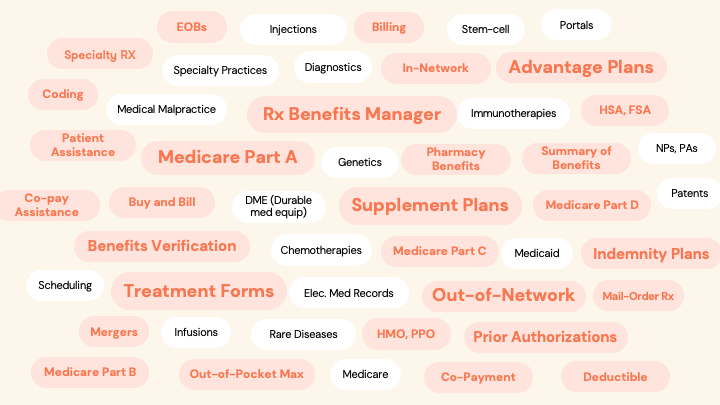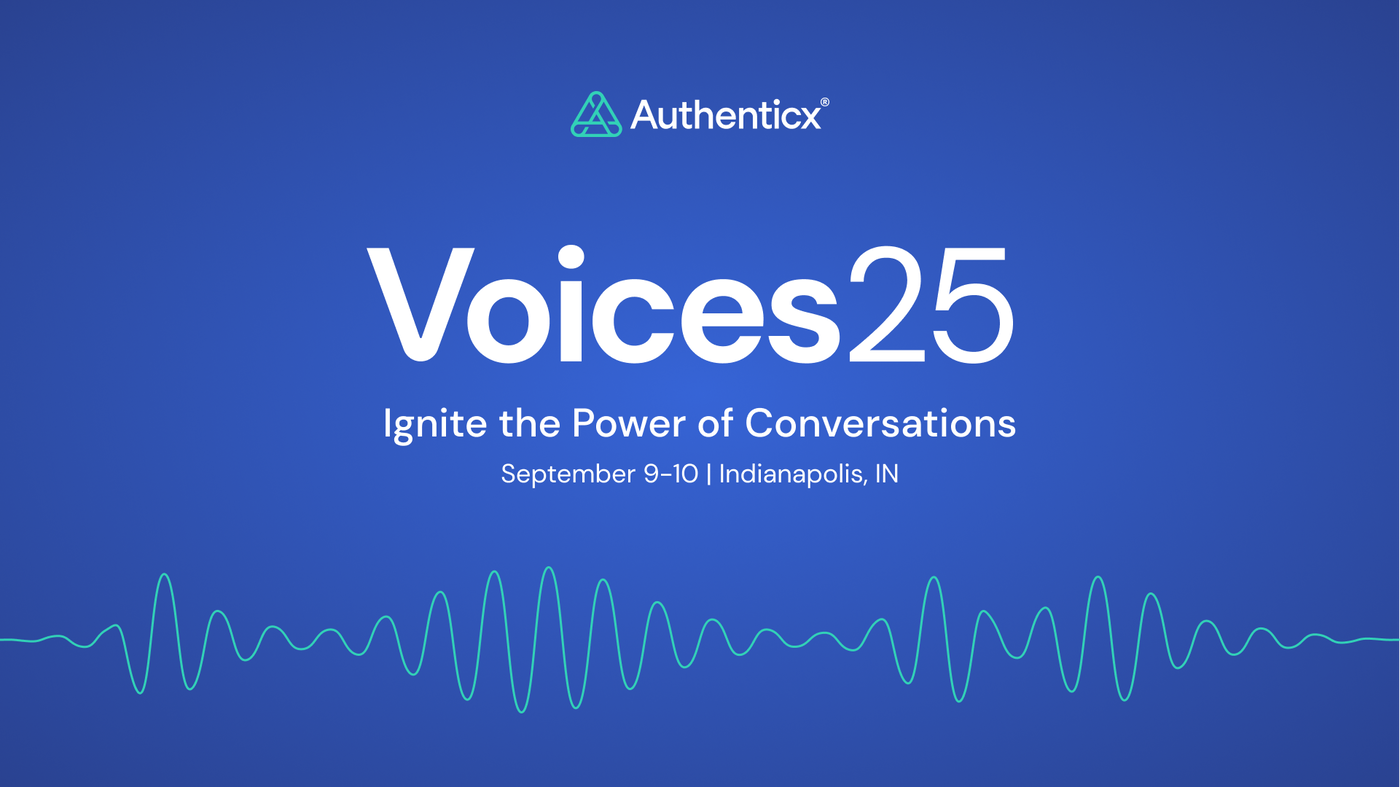
It’s no secret that healthcare in the United States can feel impossibly complex to navigate. The Centers for Medicare & Medicaid Services (CMS) reported U.S. health care spending grew 2.7% in 2021, reaching $4.3 trillion or $12,914 per person – which equates to 18% of nation’s Gross Domestic Product (GDP).
The size and scope of healthcare is immense. Countless government entities and corporate organizations participate in the care process that encompasses one-fifth of our country’s resource output.
In listening to over 200 million recorded conversations in the healthcare industry, we at Authenticx have come to recognize the interconnectedness of the burden consumers face in managing their healthcare and managing the business of their healthcare.
- Managing Care: refers to the management of clinical care which includes any effort around prevention, symptoms, diagnostics, treatment, etc. In short, “managing care” refers to the actual pursuit of physical and mental wellness.
- Managing the Business of Care: refers to the administrative steps required in order to access and pay for clinical care. This includes paperwork, billing, scheduling, cross-communication and coordination between healthcare providers, insurance companies, pharmacies, and pharmaceutical companies.
These two sides to healthcare independently hold complicated and often conflicting information that can create stress, frustration, and uncertainty for patients and caregivers. Certainly, the complexity of contemporary clinical care can be challenging for patients to understand, but complexity faced when managing the business of care may be even more challenging. From scheduling appointments and pursuing insurance coverage to approving prior authorizations and assessing treatment options after a diagnosis, patients are confronted with multifarious systems and processes that pose barriers to their healthcare which is critical to their lives.
Moreover, as consumers, year over year we feel this complexity and its financial impact:
- PwC reports: Healthcare costs are expected to rise 7% in 2024.
- State of Reform shares: 40% of Americans avoid care because they don’t understand the high costs associated with it.
- Wolters Kluwer cites: 37% of respondents chose not to fill a prescription because of the cost.
The disruption of care due to complicated administrative steps and formidable financial hoops should raise concerns as consumers often feel stuck in their pursuit of care. These disruptions result in significant frustration for customers who are trying to navigate complex processes and systems on their own, and they result in high costs to companies who must dedicate enormous resources to helping customers manage the business of their care.
More importantly, the stakes are high in healthcare when disruptions result in delays in an individual patients’ clinical care thus impacting their overall health which, in turn, has a rippling societal effect on human production capacity and the overall wellness of a community and nation.
Improving the patient experience requires us to take a hard look at the current challenges and opportunities that exist in the healthcare system today from both the clinical and administrative perspectives.
There’s no simple solution – but the emerging need demands innovation and alignment to build something better. Join us for a 3-part blog series that explores the crushing complexity of our current healthcare based on Authenticx’s analysis of millions of recorded conversations between patients, caregivers, their providers, their insurance companies, and the manufacturers of their medications.
Challenges & Opportunities on Improving the Patient Journey
The healthcare industry we know today has evolved rapidly over the last century resulting in remarkable advancements in diagnostic capabilities, treatment options, and disease management. However, alongside innovation and advancement of medical practice has come the evolution of massive healthcare organizations, resulting in complex business management between providers, insurance companies, and pharmaceutical manufacturers. Two challenges in particular that are evident in naturally occurring conversations include: 1) terminology around the business of healthcare and 2) navigation through the business of healthcare.
Existing Challenge: Terminology
Out of the rapid expansion and growth of healthcare has emerged an industry-specific vocabulary filled with terminology and jargon throughout the patient journey.


Existing Challenge: Navigation
Out of the rapid expansion and growth of healthcare has emerged an industry-specific vocabulary filled with terminology and jargon throughout the patient journey.
While acronyms and jargon like EOB, Prior Authorization, Buy and Bill, Specialty Pharmacy, and Benefits Verification are second nature to those in the industry, such vocabulary can be overwhelming to ill-prepared customers interacting with the system, driving uncertainty, confusion, and delay of care. Additionally, the rapid expansion and growth of healthcare industries offers patients more specialization of care and more treatment options than ever before, but it also places on those patients and caregivers increased demands to navigate and orchestrate relationships between their medical providers, insurance companies, pharmacies, and other entities essential to their care.
What Opportunities Exist to Improve the Patient Journey?
With rising costs and more refined and innovative diagnostic and treatment options, the business processes for administering clinical care inevitably will continue to be multi-faceted, involving multiple healthcare entities. Thus, opportunities exist to deploy the technologies and innovations that have improved clinical care to now improve the patient experience of managing the business of their care.
This means, for example, investing in tools and resources to improve health literacy so consumers can feel educated on the terminology that surrounds the business of their healthcare and the knowledge to confidently navigate the massive entities they rely on.
“Personal health literacy is the degree to which individuals have the ability to find, understand, and use information and services to inform health-related decisions and actions for themselves and others.”
As defined by Healthy People 2030
This also means leveraging tools to listen to and amplify the voices of patients and caregivers in their moments of struggle. Naturally occurring conversations are one of our most valuable sources of data and insight, and AI now allows us to listen to those conversations at scale. Being able to aggregate and share the stories from those conversations can help identify solutions and keep the human experience front and center.
Continue to Part 2 here: Reflecting to Understand Today’s Business of Healthcare
Authenticx + Crushing Complexity
Healthcare impacts all of us; this story is OUR story. Authenticx is excited to introduce Crushing Complexity: The Evolving Business of Healthcare, created by Sally Perkins. This presentation is a conversation starter around the business of healthcare, examining the past and present to prompt action for a more hopeful future. No one can deny the fact that healthcare in the U.S. is complex. But how did we get here? How do patients and caregivers experience that complexity? And are we, in fact, crushing it, or is it crushing us? Based on the study of millions of conversations from all segments of healthcare— payers, providers, and pharmaceuticals— this presentation takes a 30,000-foot view of our healthcare system and its impact on consumers and business outcomes.
Audiences come along on a journey through time, and into the experiences of patients and caregivers, to confront the complexity of the U.S. healthcare system and inspire us all to take a hard look at what we’ve created and why it must change.
We believe the key to enacting change is to listen to patients, putting their voices in the center of healthcare business discussions.

ABOUT SALLY PERKINS
Sally Perkins serves as an Insight Storyteller at Authenticx, a conversational intelligence company. In her role as an Insight Storyteller, Sally analyzes quantitative and qualitative conversational data from which she crafts impactful data-backed stories that offer insights into how healthcare organizations can improve the customer experience and improve business outcomes.
Prior to her work at Authenticx, Sally was a Professor of Rhetorical Studies at California State University Sacramento and an adjunct faculty member at Butler University in Indianapolis. She is also a professional story performer and has trained hundreds of professionals on telling compelling stories to accomplish business objectives. On Sally’s best days, she can be found telling stories to kids at Riley’s Hospital for Children in Indianapolis.
About Authenticx
Authenticx was founded to analyze and activate customer interaction data at scale. Why? We wanted to reveal transformational opportunities in healthcare. We are on a mission to help humans understand humans. With a combined 100+ years of leadership experience in pharma, payer, and healthcare organizations, we know first-hand the challenges and opportunities that our clients face because we’ve been in your shoes.
Want to learn more? Contact us!
Or connect with us on social! LinkedIn | Facebook | Twitter | Instagram | YouTube


